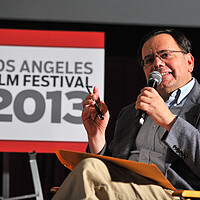‘The Holdovers’ offers a prep school Scrooge a shot at redemption
Loading...
Alexander Payne’s “The Holdovers” takes place in 1970. For the most part, it looks like it was filmed in 1970. I mean this as a compliment. To be sure, there were plenty of bad movies back then, but unlike much of today’s Hollywood fodder, at least many of that era’s best films plumbed the tribulations of people and not hardware. Payne’s new movie is not among his very best – for me, that would be “Sideways,” “The Descendants,” and his episode in the compilation film “Paris, Je T’aime” – but it has a core of feeling that made me root for it even when it sagged.
The setting is an all-boys New England prep school on the cusp of a two-week Christmas break. Paul Hunham (Paul Giamatti), the curmudgeonly instructor of ancient history, has been handed the unenviable task of supervising the on-campus stay of those few boys with no place to go for the holiday. He refers to his students as “hormonal vulgarians,” and the disdain is mutual. He even intends to assign coursework during the break, and he’s no easy grader. (He has already given one of the students an F+.)
As it turns out, all but one of the holdovers get a last-minute reprieve. Paul, with no family of his own, is left supervising Angus Tully (Dominic Sessa), a junior whose mother decided to vacation with her new husband and not include her only child. He’s as prickly as Paul.
They are joined by Mary Lamb (Da’Vine Joy Randolph), the cafeteria manager, whose son attended the school and was recently killed in Vietnam. She has chosen to stay on campus because it makes her feel closer to her boy. Following a spate of predictable head-butting, these three form an inevitable – perhaps too inevitable – trio of mutually supportive malcontents. Defying protocol, they abscond to Boston to seek out a bit of merriment.
Both Payne and his screenwriter, David Hemingson, attended prep school, as did Giamatti, whose father was the president of Yale. No doubt this helps account for the film’s air of authenticity. Less authentic are the ways in which familiar Christmas movie tropes keep popping up. One reason “The Holdovers” likely won’t be welcomed as a classic holiday movie is because it is trying too hard to be one.
This is Giamatti’s first film with Payne since the sublime “Sideways” 19 years ago, and while he’s never less than entertaining in the role, he also, at least initially, overdoes the Scrooge stuff. With his pipe, bow tie, wall-eyed glare, and sour quips, Paul is more of a crotchety conceit than a fully realized person – at least until the Boston scenes, during which we discover more about where his discontent comes from.
What enlarges Giamatti’s performance, and makes it ultimately more than a glorified comic turn, is how he gradually articulates Paul’s self-awareness for us. “I find the world a bitter and complicated place, and it seems to feel the same way about me,” Paul says in a rare unguarded moment. And yet he can’t fully break his cycle of resentfulness. This teacher of ancient history must come to terms with his own past.
Payne has always been good with actors, and “The Holdovers” is no exception. Sessa, in his first movie, has a touching vulnerability; there’s nothing cloying about the way Angus bonds with Paul. And Randolph gives her scenes – we needed more of them – a soul-deep sass and sorrowfulness. Carrie Preston, in a cameo as a school employee who moonlights as a server and bakes Christmas cookies for Paul, is an easygoing marvel.
These human moments add up. Despite its predictable arc, “The Holdovers” is full of them. Like so many of Payne’s movies, it’s about damaged people trying to fashion a new family. I don’t know if all this makes it a 1970s movie or not, but I’m thankful it came out in 2023.
Peter Rainer is the Monitor’s film critic. “The Holdovers” is rated R for language, some drug use, and brief sexual material.
Editor’s note: This review has been updated to correct the spelling of the last name of Dominic Sessa’s character.






